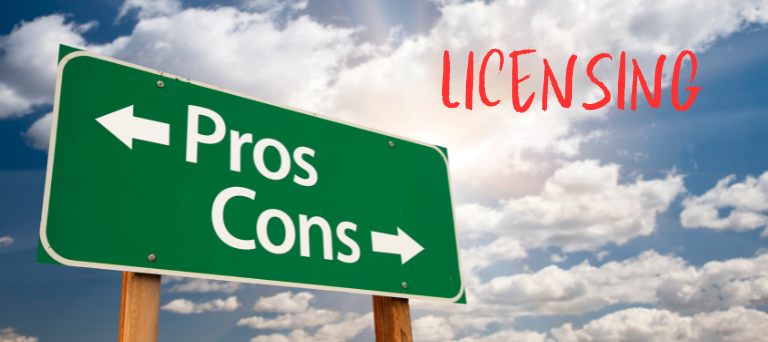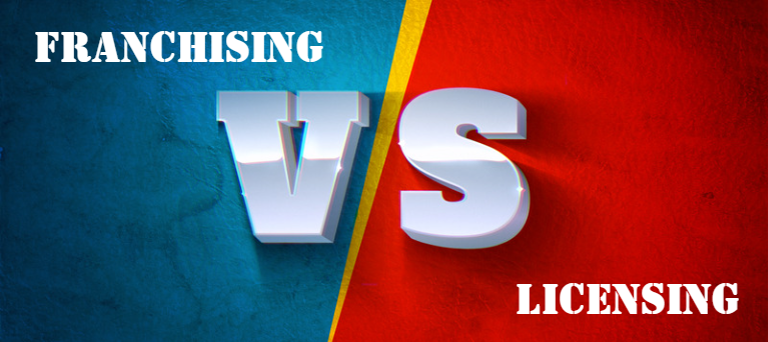Many people decide that when they start a new business they do not want to enter the business world without the advantage of a name that people know – franchising and licensing are two business options that people can use in order to start out with a popular brand and have a better chance of making strong sales in the beginning, establishing a popular business, and having a relatively high level of continuing business as the company grows.
Franchising and licensing offer different levels of involvement from the company you acquire the franchise or license from. There are upsides and downsides to each possible method of starting a company, so let us look at a few of them and understand the difference between franchising vs licensing.
What is Franchising?
Franchising is a type of business where a franchisee is granted the right to sell a franchisor’s products and services, as well as use the franchisor’s trademarks and business model. In other words, the franchisee is buying a proven business and operating it under the franchisor’s brand name.
Franchise Agreement
A franchise agreement is a legal contract that outlines the terms of the relationship between the franchisor and franchisee. This document will typically include details about fees, site selection, training, and support, as well as the level of control the franchisor has over the franchisee’s business operations.
Franchisee
A franchisee is the person or company that buys the right to use the franchisor’s brand name, products, and services. They’re responsible for setting up and running the franchise operation.

In exchange for this right, the franchisee usually pays a fee to the franchisor and follows a set of guidelines and rules laid out by the franchisor. This includes using the franchisor’s trademarks, operating procedures, and marketing strategies.
The franchisee is also responsible for managing the day-to-day operations of the franchise, including hiring and training employees, managing inventory, and providing customer service. However, the franchisor may provide support and guidance to the franchisee to help them succeed.
Franchisees can be individuals or companies, and they often have a strong entrepreneurial spirit. They may be attracted to franchising because it offers a proven business model, established brand recognition, and support from the franchisor.
In some cases, a franchisee may own multiple franchise locations, which can provide additional opportunities for growth and profitability. Overall, the success of a franchise operation depends on the collaboration and cooperation between the franchisor and franchisee.
Franchisor
The company which runs the franchise will grant the franchisee the use of the popular brand name. They will also provide supplies, materials for developing the storefront and interior of the location, assistance in choosing the specific location and sometimes in negotiating the terms of the lease.
In addition, they may even assist in negotiating a loan with the local bank for the start-up costs and ongoing costs, and general assistance as far as methods, training materials, advertising, marketing and so on.
What is Licensing?
Licensing is also a type of business agreement where the licensor grants the licensee the right to use the licensor’s intellectual property, like patents, trademarks, and copyrights, in exchange for a fee or royalty. This allows the licensee to produce and/or sell products and services under the licensor’s brand.
License Agreement
A licensing agreement is a much more simple business agreement than a franchise one.
The license agreement typically includes details about the right to use the intellectual property, as well as details about the fees and royalties that the licensee will pay to the licensor. The fee may be one-off or ongoing, giving the buyer the privilege of using the trademark or copyrighted materials on their goods or services.
Licensee
A licensee is a person or company that pays for the right to use the licensor’s intellectual property. The licensee uses this intellectual property to create products and services to sell to consumers.
Licensor
The licensor is the person or company that owns the intellectual property and has the right to license it out to others. The licensor may receive a fee or royalty in exchange for allowing the licensee to use the intellectual property.
Franchising vs Licensing: What’s the Difference?
Business Model
Franchising involves buying into a business model that has already been established, tested, and proven successful. Licensing involves the licensee using the licensor’s intellectual property to create a new business model.
Right to Use
A franchisee has the right to use the franchisor’s brand name, products, and services, while a licensee has the right to use the licensor’s intellectual property to create and sell their own products and services.
Intellectual Property
In franchising, the franchisor owns the intellectual property, and the franchisee uses it. In licensing, the licensor owns the intellectual property, and the licensee uses it to create new products and services.
Advantages and Disadvantages of Franchising

Brand Name
One of the biggest advantages of franchising is the use of the franchisor’s brand name. This saves time and money in terms of marketing and branding, as the franchisor has already established its brand.
Degree of Control
The franchisor has much control over the franchisee’s business operations, which can be an advantage for some and a disadvantage for others. While this can ensure that the franchisee operates in line with the franchisor’s standards, it can also limit the franchisee’s creativity and independence.
Franchise Fees
Franchise fees are another disadvantage of franchising. Franchisees must pay fees, such as royalties, marketing fees, and other expenses to the franchisor. These fees can cut into the franchisee’s profits, making it a less attractive option for some business owners.
Is Licensing an Alternative to Franchising?
If you’re looking for an alternative to franchising, licensing may be an option. Licensing allows the business owner to create a licensing agreement with another company, granting them access to use the business’s intellectual property, such as the brand name, logo, and products and services.
Pros and Cons of Licensing

The advantages of licensing include quick entry into new markets, minimal investment, and lower risk. However, the disadvantages of licensing include minimal control over the licensee’s business, decreasing brand value, and potential legal issues if the licensee does not follow the licensing agreement.
There will usually be stipulations which allow the owner of the trademark/copyright design to withdraw permission to use it depending on the success or otherwise of the business. There will usually be no other support from the company selling the trademark – the business agreement will be limited to the right to use the licensed property.
Whilst this enables a certain freedom it also means there is no advice and assistance as there would be for a franchisee.
The upside for the licensee is the image that they are able to acquire, while the downside is that they do not receive any help in figuring out how best to use the licensed images or designs. There is usually no agreement for the sharing of business data and the licensee will have to try to work out the best way to use their purchase on their own.
Suppose the licensor provides extra help to the licensee. In that case, local laws may try to redefine the business relationship between the two companies as a franchisor/franchisee relationship. Consequently, the licensor may have to specifically define and restrict its assistance in accordance with the advice of their lawyers.
Whenever you are entering a situation that involves intellectual property rights the advice of legal counsel is imperative.
Contract Law
Contract law is crucial in both franchising and licensing. A well-drafted agreement can help mitigate conflict and clearly outline the terms of the relationship between the franchisor/licensor and franchisee/licensee.
Franchisor and Franchisee Relationship
Franchising and licensing also differ in terms of the relationship between the franchisor/licensor and the franchisee/licensee. Franchisees are essentially buying into an established business model, while licensees are using intellectual property to create a new type of business.
Examples of Franchise and License Models
Franchise:
- McDonald’s: Franchisees pay fees to operate a McDonald’s restaurant, using the company’s brand, systems, and products while following specific guidelines and standards.
- Subway: Franchisees own and operate Subway sandwich shops, adhering to the company’s branding, menu, and operational procedures.
License:
- Software License: A company grants a license to use its software product, specifying the terms, conditions, and limitations of usage.
- Merchandise License: A popular character or brand licenses its image or logo to be used on various products such as clothing, toys, or accessories, while the licensee pays royalties or fees for the right to produce and sell those items.
Let’s Compare the Difference
| Aspect | Franchising | Licensing |
|---|---|---|
| Business Model | Buying into an established business model | Using intellectual property to create a new business model |
| Right to Use | Use of franchisor’s brand name, products, and services | Use of licensor’s intellectual property |
| Intellectual Property Ownership | Franchisor owns the intellectual property | Licensor owns the intellectual property |
| Level of Control | Franchisor has significant control over franchisee’s business operations | Minimal control over licensee’s business |
| Brand Name | Franchisee benefits from an established brand | Licensee gains access to a recognized brand |
| Support and Assistance | Franchisor provides support, training, and guidance | Limited or no support from the licensor |
| Fees and Expenses | Franchisees pay fees, royalties, and other expenses to the franchisor | Licensees pay fees or royalties to the licensor |
| Investment and Risk | Higher investment and potential risks for franchisees | Lower investment and risk for licensees |
| Business Relationship | Franchisees buy into an existing business model | Licensees use intellectual property to create a new business |
| Examples | McDonald’s, Subway | Software license, merchandise license |
Conclusion
While franchising provides a proven business model and established brand, licensing allows for lower risk and minimal investment. Business owners must carefully consider their options and consult experts to determine which is best for their circumstances.
Whether you are planning to start your own new business, or just looking for a way to increase your profits and expand from the business that you have already established, an understanding of the differences between franchising and licensing will help you find a way to meet your business goals and reap the rewards.
There are various ways to distribute products and services of which franchising is just one. The differences between franchising and licensing or other distribution arrangements are sometimes unclear but generally the “purer’ the form of franchising which is implemented the greater the chance of success.
Please note: None of the above constitutes financial and/or legal advice. We advise people to seek their own professional advice suited to their personal circumstances. You can find franchise specialist legal and accounting services in our directory.






